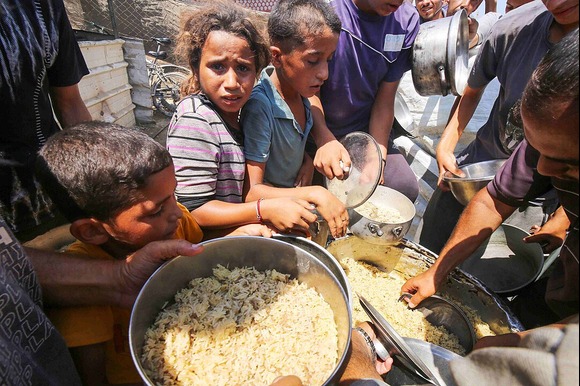Gaza stands on the brink of famine as a relentless blockade continues to choke the flow of critical humanitarian aid, including food, medicine, and essential supplies. The World Health Organization (WHO) has warned that the entire population of 2.1 million people is suffering from hunger, with nearly half a million individuals already living in catastrophic conditions. The WHO has described the crisis as the worst hunger emergency in the world today.
In a statement issued on Monday, the WHO declared, “The risk of famine in Gaza is increasing due to the deliberate obstruction of humanitarian aid, including food, amid the ongoing blockade. The entire 2.1 million population of Gaza is experiencing prolonged food scarcity, and nearly half a million people are enduring catastrophic levels of hunger, acute malnutrition, illness, starvation, and death. This is one of the most severe hunger crises the world has seen, and it is unfolding before our eyes.” This warning was supported by findings from the latest food security analysis conducted by the Integrated Food Security Phase Classification (IPC) partnership, of which WHO is a key member.

The death of the 17-year-old Palestinian youth, Mohammed Assaf, from northern Gaza, as a result of the famine and humanitarian crisis in the Strip.
WHO Director-General Tedros Adhanom Ghebreyesus emphasized that Gaza is already engulfed in a severe hunger crisis. He pointed out that people are starving, becoming ill, and dying while lifesaving food and medical supplies sit just minutes away on the other side of the border.
“We do not need to wait for an official declaration of famine to recognize that people in Gaza are already starving, sick, and dying—while essential food and medicines remain within close reach but inaccessible. The analysis released today clearly shows that without immediate, unimpeded access to food and critical supplies, the humanitarian situation will worsen further, leading to more deaths and ultimately famine. We urge for an immediate end to the aid blockade, the release of all hostages, and the implementation of a ceasefire,” Ghebreyesus stated.
Since the blockade on aid began on March 2, the Ministry of Health has reported that 57 children have died due to the effects of malnutrition. However, this number is likely underestimated and expected to rise. If the current crisis continues, nearly 71,000 children under the age of five are projected to suffer from acute malnutrition over the next eleven months, according to the IPC.
Additionally, the WHO highlighted the plight of pregnant and breastfeeding mothers, who are at particularly high risk. Around 17,000 are expected to require treatment for acute malnutrition in the coming months if no action is taken. Malnourished mothers often cannot produce sufficient nutritious breastmilk, jeopardizing the health of their babies. The availability of counselling and maternal support services has also been significantly disrupted. For infants under six months old, breastmilk remains their primary defense against hunger and disease—especially in areas like Gaza, where clean water is scarce, WHO noted.






